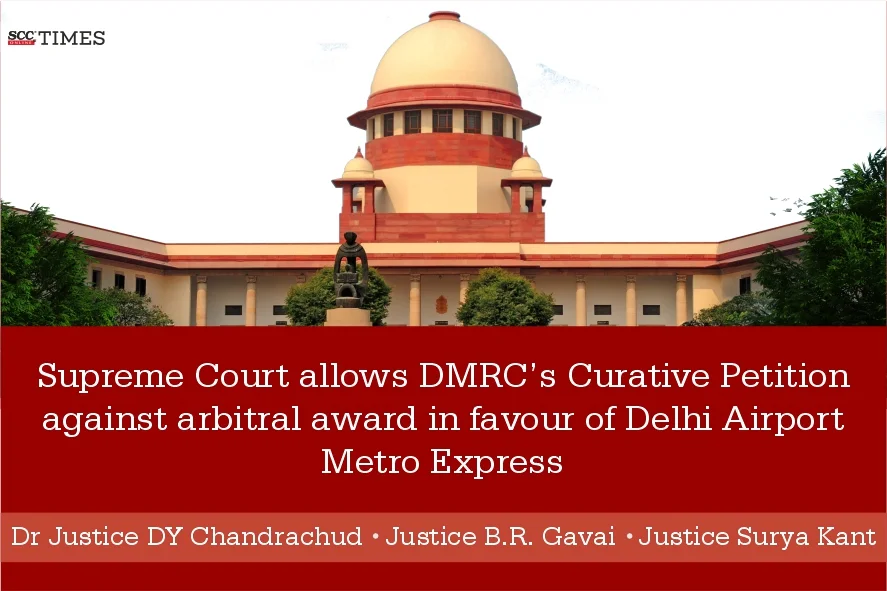Supreme Court: In a curative petition filed by Delhi Metro Rail Corporation (‘DMRC’) against the Judgment passed by two-judge Bench of Supreme Court in Delhi Airport Metro Express (P) Ltd. v. DMRC, (2022) 1 SCC 131, wherein the Court set aside the decision of the Division Bench of the Delhi High Court and restored the arbitral award, the three Judge Bench of Dr DY Chandrachud*,CJI, B R Gavai, and Surya Kant, JJ. while allowing the curative petition, held that the impugned judgment which interfered with the judgment of the Division Bench has resulted in a miscarriage of justice. The judgment of the Division Bench in the appeal under Section 37 of the Arbitration and Conciliation Act 1996 (‘the Act’) was based on a correct application of the test under Section 34 of the Act and provided more than adequate reasons to conclude that the arbitral award suffered from perversity and patent illegality. There was no valid basis for this Court to interfere under Article 136 of the Constitution, and the interference has resulted in restoring a patently illegal award, which has caused a grave miscarriage of justice.
Background:
DMRC is a state-owned company wholly owned by the Government of India and the National Capital Territory of Delhi. The respondent, Delhi Airport Metro Express Private Limited (‘DAMEPL’) is a special purpose vehicle incorporated by a consortium comprising of Reliance Infrastructure Limited and Construcciones Y Auxiliar de Ferrocarriles SA, Spain.
The consortium bagged the contract for the construction, operation and maintenance of the Delhi Airport Metro Express Ltd in 2008. The Concession Agreement envisaged a public-private partnership for providing metro rail connectivity between New Delhi Railway Station and the Indira Gandhi International Airport and other points within Delhi.
Under the 2008 Agreement, DAMEPL was granted exclusive rights, license and authority to implement the project and concession in respect of Airport Metro Express Limited (‘AMEL’). DAMEPL was to complete the work in two years, and thereafter, to maintain AMEL until August 2038. In April 2012, DAMEPL sought a deferment of the concession fee, citing delays in providing access to the stations by DMRC. DAMEPL urged DMRC to extend their support to this first-of-its-kind public-private partnership by deferring the concession fee payable by DAMEPL.
Ministry of Urban Development intervened to convene a meeting of stakeholders. A Joint Inspection Committee was set up to inspect the defects alleged by DAMEPL. Meanwhile, DAMEPL expressed its intention to halt operations, alleging that the line was unsafe to operate. On 8 October 2012, DAMPEL issued a notice terminating the 2008 agreement.
DMRC initiated conciliation under clause 36.1 of the 2008 Agreement. Since conciliation failed, DMRC started arbitration proceedings on 23-10-2012 under clause 36.2 of the 2008 agreement. On 11 —05-2017, the three-member Tribunal passed a unanimous award in favour of DAMEPL.
Assailing the award, DMRC instituted an application under Section 34 of the Arbitration and Conciliation Act 1996 before the Delhi High Court. The Single-Judge of the High Court dismissed the petition. This gave rise to an appeal under Section 37 before a Division Bench of the High Court. The appeal was partly allowed. Against the decision of the Division Bench, DAMEPL moved a SLP under Article 136 of the Constitution. A two-judge bench of this Court allowed the appeal and restored the award. The review petition assailing this decision was dismissed. Thus, the curative petition.
Issues:
(i) Whether the curative petition is maintainable;
(ii) Whether this Court was justified in restoring the arbitral award which had been set aside by the Division Bench of the High court on the ground that it suffered from patently illegality?
Analysis:
After taking note of Rupa Ashok Hurra v. Ashok Hurra, (2002) 4 SCC 388,the Court laid down the contours of the jurisdiction of this Court to entertain a curative petition in exercise of its inherent powers under Article 142. It reiterated that the Court may entertain a curative petition to (i) prevent abuse of its process; and (ii) to cure a gross miscarriage of justice. Further, it said that the enumeration of the situations in which the curative jurisdiction can be exercised is thus not intended to be exhaustive.
The Court noted that Section 34 of the Arbitration Act delineates the grounds for setting aside an arbitral award and said that the Court must apply settled principles of judicial review such as whether the findings of the High Court are borne out from the record or are based on a misappreciation of law and fact. The Court must be slow in interfering with a judgment delivered in the exercise of powers under Section 37, unless there is an error in exercising of the jurisdiction by the Court. Unlike the exercise of power under Section 37, which is akin to Section 34, this Court under Article 136 must limit itself to testing whether the Court acting under Section 37 exceeded its jurisdiction by failing to apply the correct tests to assail the award.
The Court noted that the Division Bench found the award to be perverse, irrational and patently illegal since it ignored the vital evidence of Commissioner of Metro Railway Safety (‘CMRS’) certification in deciding the validity of termination. In appeal against the judgment of the Division Bench, this Court disagreed with the Division Bench and held that the CMRS certificate had no bearing on the validity of the termination.
Further, the Court said that there is a fundamental error in the manner in which this Court dealt with the challenge to the decision of the High Court. The jurisdiction of this Court was invoked under Article 136 of the Constitution. The award overlooked the express terms of clause 29.5.1(i) which stipulated that if “effective steps” were taken during the cure period by DMRC, the contractual power to terminate could not be exercised. Thus, the Court said that this Court incorrectly considered the CMRS certificate to be irrelevant to the validity of the termination.
The Court noted that the Tribunal found that since certain defects remained after the cure period, this was indicative of the fact that the defects were not cured and that no effective steps were taken. However, as per the Court, the Tribunal failed to explain what amounts to an ‘effective step’ and how the steps taken by DMRC were not effective, within the meaning of the phrase.
Further, the Bench said that the Tribunal did not appreciate the individual import of the two phrases separately from each other. This was not a matter of mere “alternate interpretation” of the clause, but an unreasonable and uncalled for interpretation of the clause, which frustrated the very provision, and which no reasonable person would have accepted considering the terms of the clause.
The Bench also clarified that the Tribunal could have still concluded that the steps taken during the cure period were not effective within the clause’s meaning for certain reasons. However, such discussion and reasoning were conspicuously absent.
The Court remarked that the decisions of the Single Judge and this Court are similarly silent on the aspect of “effective steps”. Further, the Bench said that he judgment of this Court also never tested the relevance of the CMRS certificate vis-à-vis “effective steps”. This Court accepted a reading of the termination clause by the Arbitral tribunal and the Single Judge that was not even a possible view and could not have been arrived at on any objective assessment. This Court not only overlooked the plain words of the clause but also rendered the phrase “effective steps” otiose.
After referring to Sections 14 and 15 of the Metro Railways (Operations and Maintenance) Act, 2002 (‘2002 Act’), the Court noted that no metro line will operate except with the previous sanction of the Central Government. Before granting the sanction, the Central Government has to obtain a report from the Commissioner that the latter has carefully inspected the metro railway, the general structure of civil works and that in their opinion, the metro railway can be opened for passengers without any danger to the public. Thus, the structure and safety of the project, as certified by the CMRS, were relevant before the Tribunal, making the CMRS certificate a vital piece of evidence in deciding the issue.
The Court said that rather than considering the vital evidence of the CMRS certificate towards safety and effective steps, the Arbitral Tribunal focused on the conditions imposed by the Commissioner on speed and regarding inspections. While the Division Bench correctly noted that the certificate was relevant for the issue of the validity of termination, this Court held that safety was not in issue, even though DAMEPL insisted on discontinuing operations citing safety concerns. Thus, the Court disagreed with this Court’s reassessment of the Division Bench’s interpretation.
The Bench said that the award contains no explanation as to why the steps which were taken by DMRC were not ‘effective steps’ within the meaning of the termination clause. Therefore, the award is unreasoned.
The Court concluded that the Division Bench of the High Court applied the correct test in holding that the arbitral award suffered from the vice of perversity and patent illegality. This Court failed, while entertaining the SLP under Article 136, to justify its interference with the well-considered decision of the High Court. The decision of this Court fails to adduce any justification bearing on any flaws in the manner of exercise of jurisdiction by the Division Bench under Section 37 of the Arbitration Act.
The Court further said that by setting aside the judgement of the Division Bench, this Court restored a patently illegal award which saddled a public utility with an exorbitant liability. This has caused a grave miscarriage of justice, which warrants the exercise of the power under Article 142 in a Curative petition.
The Bench also clarified that the exercise of curative jurisdiction should not be adopted as a matter of ordinary course. The curative jurisdiction should not be used to open the floodgates and create a fourth or fifth stage of court intervention in an arbitral award, under this Court’s review jurisdiction or curative jurisdiction, respectively.
The Court restored the parties to the position in which they were on the pronouncement of the judgement of the Division Bench and discontinued the execution proceedings before the High Court for enforcing the arbitral award. Further, it directed the amounts deposited by DMRC to be refunded. The Court also set aside the orders passed by the High Court during the execution proceedings for enforcing the arbitral award.
CASE DETAILS
2024 SCC OnLine SC 522 Appellants : Respondents : |
Advocates who appeared in this case For Petitioner(s): For Respondent(s): |
CORAM :












